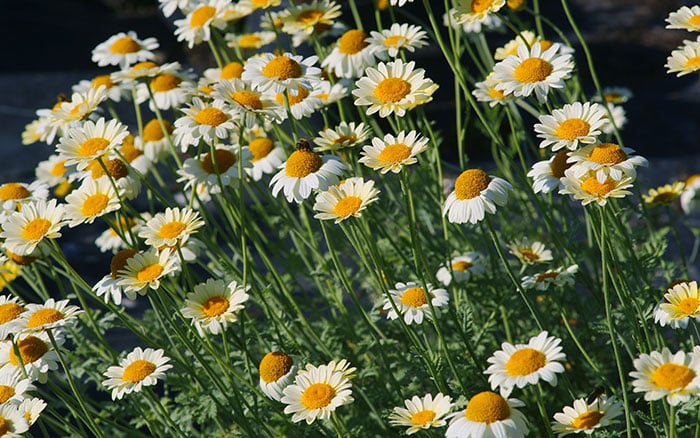Weeds are defined as a wild plant that’s growing where it’s not wanted. But did you know that some of the garden plants that we see as common weeds are actually edible, and taste good too?
Before you get started with snacking on weeds, never eat anything that you’re not 100% sure can be consumed, because some plants are toxic and can be incredibly harmful if ingested. Also, don’t eat anything that’s been sprayed with pesticides.
So, here are some garden weeds that you can eat…
Chamomile
The daisy-like flowers of chamomile can be used as a tea herb by putting the flowers into a teapot with boiling water and leaving them to infuse for 2-3 minutes. For some sweetness, add in some honey and serve for a tasty and beneficial beverage.
Drinking chamomile tea is widely thought to help relaxation and sleep, as well as reducing menstrual pain and cramps.

Not only can the flowers be used in tea, but they can also be using in porridge, salad, and other summery infused drinks.
Dandelions

An incredibly common garden weed that’s often overlooked, they are actually edible – raw or cooked. However, if you want to try them raw, harvesting young leaves is best because mature leaves can have a bitter taste.
The mature leaves can be added to soups and stews, and the roots can be added into stir fries. In Asian cuisine, the leaves are used in a similar fashion to lettuce.
The flower buds can be eaten in omelettes, and the flowers can be baked into cakes for a floral addition to desserts.
Nettles
Surprisingly tasty, nettles can be used in the same way as spinach, to make tea, soup, or even a homemade pesto.
When harvesting leaves, the tips are the best because they are the most tender and have the best flavour. However, be sure to wear gloves to protect your skin from stinging.
Once the nettle has been dried, freeze dried or cooked, they’re safe to eat.

Nettles have been used since ancient times as a medicine to treat muscle pain and arthritis.
It’s been said to reduce inflammation and also offers a variety of vitamins and minerals including A, C, K, calcium, iron, and magnesium.
Chickweed

This low, creeping plant has oval shaped leaves joined by small white flowers. The leaves cane be picked when they are young and fresh, which is when they are most tender.
Again, these can be added raw to salads, dressings, pizzas, pastas, or used to make a delicious pesto. The pretty flowers are also edible so can be used to top salads for a dainty addition.
Chickweed has been used for its healing and soothing properties, for reducing inflammation, fighting germs and promoting wound healing.
Steeping chickweed leaves in hot water to make tea can be used to relieve pain and give cooling and soothing effects.
Hairy bittercress
This can be found growing between cracks and crevices in pavements, walkways and plant pots. But which part of this weed is edible? All of it.
When young, the leaves and flowers can be picked and washed well before adding to soups, salads, pesto in a similar way to cress or rocket to add a hot and peppery taste. It’s best to eat raw because cooking can lead to the leaves losing their flavour.


Leave A Comment